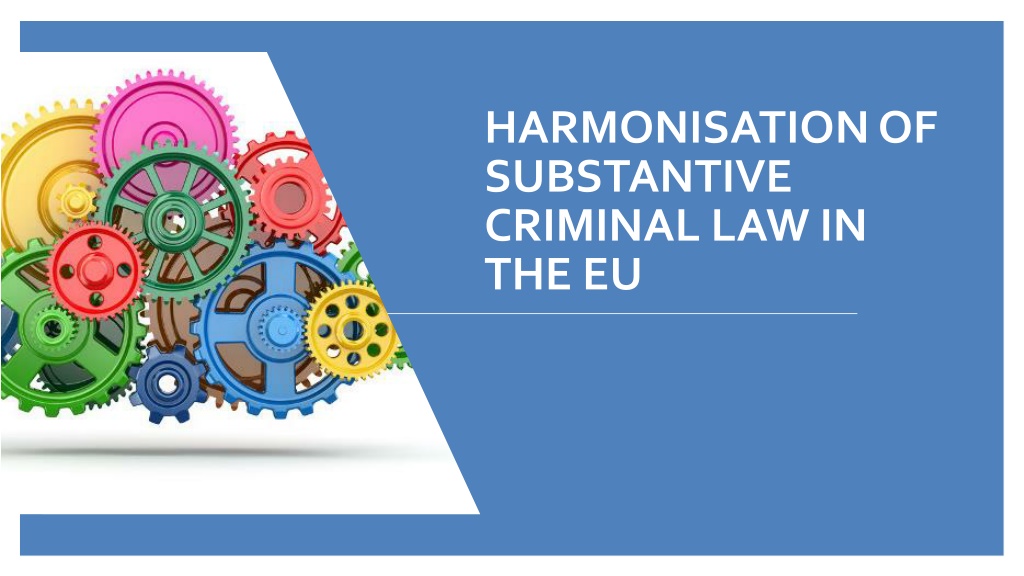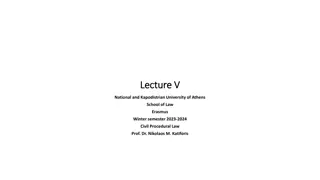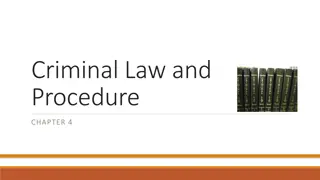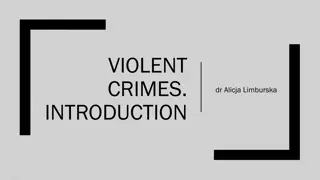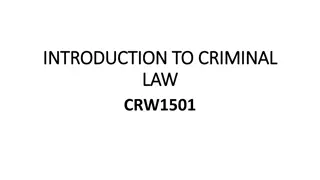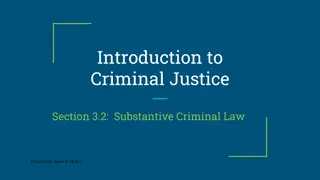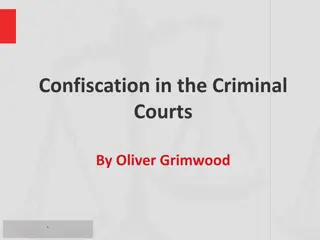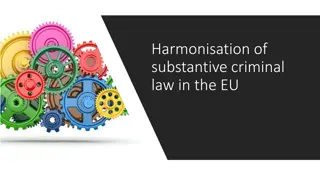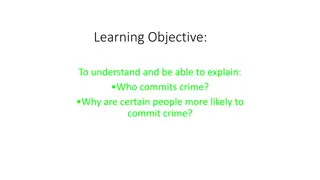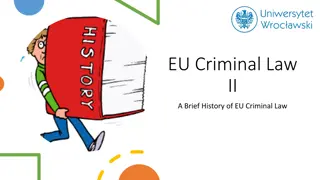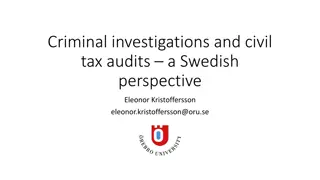Harmonisation of Substantive Criminal Law in the EU
The Treaty of Lisbon serves as a legal foundation for the harmonisation of substantive criminal law within the European Union. It establishes the basis for judicial cooperation, mutual recognition of judgments, and approximation of laws across Member States. The treaty allows for the establishment of minimum rules on defining criminal offenses and sanctions for serious crimes with cross-border implications. Specific areas covered include terrorism, human trafficking, drug trafficking, corruption, and more. Overall, the treaty aims to harmonise criminal laws to combat crime effectively on a common basis.
Download Presentation

Please find below an Image/Link to download the presentation.
The content on the website is provided AS IS for your information and personal use only. It may not be sold, licensed, or shared on other websites without obtaining consent from the author. Download presentation by click this link. If you encounter any issues during the download, it is possible that the publisher has removed the file from their server.
E N D
Presentation Transcript
HARMONISATION OF SUBSTANTIVE CRIMINAL LAW IN THE EU
Treaty of Lisbon legal basis of harmonisation Article 82 Judicial cooperation in criminal matters in the Union shall be based on the principle of mutual recognition of judgments and judicial decisions and shall include the approximation of the laws and regulations of the Member States in the areas referred to in paragraph 2 (criminal procedure rules) and in Article 83 (substantive criminal law).
Treaty of Lisbon legal basis of harmonisation Article 83 1. The European Parliament and the Council may, by means of directives adopted in accordance with the ordinary legislative procedure, establish minimum rules concerning the definition of criminal offences and sanctions in the areas of particularly serious crime with a cross-border dimension resulting from the nature or impact of such offences or from a special need to combat them on a common basis.
Treaty of Lisbon legal basis of harmonisation Article 83 Theseareasofcrime arethefollowing: terrorism, trafficking in human beings andsexual exploitationof womenandchildren, illicit drugtrafficking, illicit armstrafficking, moneylaundering, corruption, counterfeitingofmeansofpayment, computercrime, organisedcrime.
Treaty of Lisbon legal basis of harmonisation Article 83 2. If the approximation of criminal laws and regulations of the Member States proves essential to ensure the effective implementation of a Union policy in an area which has been subject to harmonisation measures, directives may establish minimum rules with regard to the definition of criminal offences and sanctions in the area concerned. Such directives shall be adopted by the same ordinary or special legislative procedure as was followed for the adoption of the harmonisation measures in question
Positive and negative integration Negative harmonisation sideeffect offour freedoms Positive harmonisation Framework decisions only one framework decision left in a substantive crminal law area: Council Framework Decision 2008/913/JHA of 28 November 2008 on combating certainforms andexpressionsofracismandxenophobiaby meansofcriminallaw Directives: relatively new instrument in the EU substantive criminal law area (after the LisbonTreaty)
Negative integration/harmonisation Case C-55/94, Reinhard Gebhard v. Consiglio dell Ordine degliAvvocati e Procuratori di Milano,1995 37 It follows, however, from the Court' s case-law that national measures liable to hinder or make less attractive the exercise of fundamental freedoms guaranteed by the Treaty must fulfil four conditions: they must be applied in a non-discriminatory manner; they must be justified by imperative requirements in the general interest; they must be suitable for securing the attainment of the objective which they pursue; and they must not go beyond what is necessary in order to attain it.
Why is there a needto harmonise substantive crminal law? 1. Complimentary measure to mutual recognition of decisions in criminal matters (harmonised criminal law makes it easier to accept foreign decisions in criminal cases and execute them; enhances mutual trust, particular importance in cases where double criminality principle is not applicable). 2. Protection of EU financial interests and effectiveness of EU policies (EU Directive on the protection ofthe euro, PIFDirective combatingfraud). 3. Safeguarding citizens well-being in the area of freedom, security and justice and basic values of the EU (e.g. fight against terrorism, human trafficking, sexual exploitation of children). 4. Strenghtening the ability to effectively combat crime at national level in cases of transnational criminality.
Framework decision2008/913 Council Framework Decision 2008/913/JHA of 28 November 2008 on combating certain forms and expressions of racism and xenophobia by means of criminal law Definitions of offences 1. Liability of legal persons (article 5 6) 2. Effective investigative measures (article 7-8) 3.
Is racism/anti-Semitism/disrimination still a problem in Europe? What do youthink? Do youknow anyexamples of racism/xenofobia/discrimination? Isthere anychanges in the society? What is a hate speach? Isit something similar to racism etc.? Do the companies like Facebook [Meta], X or other have obligations to fight against hate speech? What aboutpostson those platforms?
Framework decision2008/913 Offences concerning racism andxenophobia 1. conduct ispunishable: Each Member State shall take the measures necessary to ensure that the following intentional (a) publicly inciting to violence or hatred directed against a group of persons or a member of such a group definedbyreference to race, colour, religion, descent or national or ethnic origin; (b) the commission of an act referred to in point (a) by public dissemination or distribution of tracts, pictures or other material; (c) publicly condoning, denying or grossly trivialising crimes of genocide, crimes against humanity and war crimes as defined in Articles 6, 7 and 8 of the Statute of the International Criminal Court, directed against a group of persons or a member of such a group defined by reference to race, colour, religion, descent or national or ethnic origin when the conduct is carried out in a manner likely to incite to violence orhatred againstsuch agroup or amemberof such a group; (d) publicly condoning, denying or grossly trivialising the crimes defined in Article 6 of the Charter of the International Military Tribunal appended to the London Agreement of 8 August 1945, directed against a group of persons or a member of such a group defined by reference to race, colour, religion, descent or national or ethnic origin when the conduct is carried out in a manner likely to incite to violence or hatred against such a group or a member of such a group.
Framework decision2008/913 Article 3 Criminal penalties 1. conduct referred to in Articles 1 and 2 is punishable by effective, proportionate and dissuasive criminal penalties. Each Member State shall take the necessary measures to ensure that the 2. conduct referred to in Article 1 is punishable by criminal penalties of amaximumof atleast between 1and3 years ofimprisonment. Each Member State shall take the necessary measures to ensure that the
New initiative On 9 December 2021, the Commission adopted a Communication on 'A more inclusive and protective Europe: extending the list of EU crimes to hate speech and hate crime' which aims to trigger a Council Decision extending to hate crime and hate speech the current list of so-called EU crimes as laid down in Art 83 TFEU. Such decision would enable the Commission, in a second stage, to strengthen the legal framework on tackling hate speech and hate crime across the EU. https://commission.europa.eu/strategy-and-policy/policies/justice-and- fundamental-rights/combatting-discrimination/racism-and- xenophobia/extending-eu-crimes-hate-speech-and-hate-crime_en
New initiative As a second step, the Commission may propose the adoption of directives establishing minimum rules on the definitions and sanctions of hate speech and hate crime to be adopted by the European Parliament and the Council in line with the ordinary legislative procedure. Rights ofthe minorities should be more protected. There are several plans/programms: EUAnti-racismActionPlan2020-2025 UnionofEquality:LGBTIQEqualityStrategy2020-2025 EUstrategy onCombatingAntisemitism andFosteringJewishLife(2021-2030)
HatespeachagainstLGBTQ community E.g.: Russia: https://www.reuters.com/article/us-russia-lgbt-crime-idUSKBN1DL2FM Poland (vice Minister of Justice): https://twitter.com/marcinwarchol/status/1609282119724834817?lang=en https://edition.cnn.com/interactive/2020/10/world/lgbt-free-poland-intl-scli-cnnphotos/ LGBTQ+ free zones in Poland https://www.france24.com/en/europe/20230516-homophobic-attacks-in-france-rose- almost-30-percent-last-year-lgbtq-group-says<--increasingnumer of homophobicattack
Holocaust denial https://www.europarl.europa.eu/RegData/etudes/BRIE/2021/698043/EPRS_BRI(20 21)698043_EN.pdf See also: https://hudoc.echr.coe.int/eng#{%22itemid%22:[%22001-72786%22]} Witsch v. Germany
Antisemitism in EropeCNN report https://edition.cnn.com/interactive/2018/11/europe/antisemitism-poll-2018-intl/ A third of Europeans said that Jews use the Holocaust to advance their own positions or goals. 12% of youngAustrian haven t heard aboutHolocaust https://edition.cnn.com/interactive/2018/11/europe/antisemitism-poll-2018-intl/
Gender-basedviolenceand EU EU can can ratify the IstanbulConvention OPINION 1/19 OF THE COURT (Grand Chamber); 6 October 2021: https://curia.europa.eu/juris/document/document.jsf?text=&docid=247081&pageIndex= 0&doclang=EN&mode=lst&dir=&occ=first&part=1&cid=11501 Council of Europe Convention on preventing and combating violence against women anddomestic violence https://www.coe.int/en/web/istanbul-convention/home?
Istambulconventionarticle1 ThepurposesofthisConventionare to: protect women against all forms of violence, and prevent, prosecute and eliminate violence againstwomen anddomestic violence; contribute to the elimination of all forms of discrimination against women and promote substantive equality between women and men,including byempowering women; design a comprehensive framework, policies and measures for the protection of and assistanceto allvictimsof violence against women anddomesticviolence; promote international co-operation with a view to eliminating violence against women and domestic violence; provide support and assistance to organisations and law enforcement agencies to effectively co-operate in order to adopt an integrated approach to eliminating violence against women anddomesticviolence. 2 In order to ensure effective implementation of its provisions by the Parties, this Conventionestablishesaspecificmonitoringmechanism.
Definitionsarticle3 violence against women is understood as a violation of human rights and a form of discrimination against women and shall mean all acts of gender-based violence that result in, or are likely to result in, physical, sexual, psychological or economic harm or suffering to women, including threats of such acts, coercion or arbitrary deprivation of liberty, whether occurring in public or in private life; domestic violence shall mean all acts of physical, sexual, psychological or economic violence that occur within the family or domestic unit or between former or current spouses or partners, whether or not the perpetrator shares or has shared the same residence with the victim;
Substantivecriminal law provisions Article32 Civilconsequences offorced marriages Parties shall take the necessary legislative or other measures to ensure that marriages concluded under force may be voidable, annulled or dissolved without undue financial or administrative burden placed on the victim. Article33 Psychologicalviolence Parties shall take the necessary legislative or other measures to ensure that the intentional conduct of seriously impairing a person s psychological integrity through coercion or threats iscriminalised. Article34 Stalking Parties shall take the necessary legislative or other measures to ensure that the intentional conduct of repeatedly engaging in threatening conduct directed at another person, causing her or him to fear for her or his safety, is criminalised. Article35 Physicalviolence Parties shall take the necessary legislative or other measures to ensure that the intentional conduct of committing acts of physical violence against another person is criminalised.
Substantivecriminal law provisions Article 36 Sexual violence, including rape Parties shall take the necessary legislative or other measures to ensure that the followingintentionalconducts arecriminalised: A) engaging in non-consensual vaginal, anal or oral penetration of a sexual nature of the body ofanotherperson withanybodily partor object; B)engaginginothernon-consensualactsofasexualnature withaperson; C) causing another person to engage in non-consensual acts of a sexual nature with a third person. 2 Consent must be given voluntarily as the result of the person s free will assessed in the context of the surrounding circumstances. 3 Parties shall take the necessary legislative or other measures to ensure that the provisions of paragraph 1 also apply to acts committed against former or current spousesorpartners asrecognisedby internallaw.
Substantivecriminal law provisions Article37 Forced marriage 1. Parties shall take the necessary legislative or other measures to ensure that the intentional conduct of forcing anadultor achild to enter into amarriage iscriminalised. 2. Parties shall take the necessary legislative or other measures to ensure that the intentional conduct of luring an adult or a child to the territory of a Party or State other than the one she or he resides in with the purpose of forcing this adult or child to enter into a marriage is criminalised. Article38 Female genitalmutilation Parties shall take the necessary legislative or other measures to ensure that the following intentional conducts arecriminalised: excising, infibulating or performing any other mutilation to the whole or any part of a woman s labia majora,labia minora orclitoris; coercing or procuring a woman toundergoanyoftheacts listed inpoint a; inciting, coercing or procuringa girl toundergoanyoftheacts listed inpoint a.
Substantivecriminal law provisions Article 39 Forced abortion andforced sterilisation Parties shall take the necessary legislative or other measures to ensure that the followingintentionalconducts arecriminalised: A) performingan abortion ona woman without herpriorand informed consent; B) performing surgery which has the purpose or effect of terminating a woman s capacity to naturally reproduce without her priorand informedconsentor understanding of the procedure. Article 40 Sexual harassment Parties shall take the necessary legislative or other measures to ensure that any form of unwanted verbal, non-verbal or physical conduct of a sexual nature with the purpose or effect of violating the dignity of a person, in particular when creating an intimidating, hostile, degrading, humiliating or offensive environment, is subject to criminal or other legalsanction.
Whatisthe definitione of rape? Poland: Whoever, by force, illegal threat or deceit subjects another person to sexual intercourse shall be subject to the penalty of the deprivation of liberty for a term of between 2 and12 years. If the perpetrator, in the manner specified in 1, makes another person submit to other sexual act or to perform such an act, he shall be subject to the penalty of the deprivation ofliberty foraterm ofbetween 6 monthsand8years. If the perpetrator commits the rape 1) in common with another person, 2) against a minor under 15 years of age, 3) against an ascendant, descendant, or a person being adopted, or brother or sister, he shall be subject to the penalty of deprivation of liberty foraminimum term of3years. If the perpetrator of the crime specified in 1 - 3 acts with particular cruelty, he shall be subject to the penalty of deprivation of liberty for a minimum term of 5 years.
Whatisthe definitione of rape? Spain: When the sexual assault consists of vaginal, anal or oral penetration, or inserting body parts or objects into either of the former two orifices, the offender shall be convicted of rape with a sentence of imprisonment from sixto twelve years. Sweden: When someone, by assault or otherwise with violence or by the threat of a criminal act, compels apersonto havesexualintercourse or acomparable sexualact. Observations Rape may also be committed when the victim has not been compelled, but the perpetrator has improperly exploited the fact that a person is in a helpless state, owing to, for instance, unconsciousness, sleep, intoxication or other influence of drugs, illness, bodily injury or mental impairment. https://eige.europa.eu/gender-based-violence/regulatory-and-legal-framework
How rapeshouldbe prosecuted? Article 55 Ex parte and ex officio proceedings 1 Parties shall ensure that investigations into or prosecution of offences established in accordance with Articles 35, 36, 37, 38 and 39 of this Convention shall not be wholly dependant upon a report or complaint filed by a victim if the offence was committed in whole or in part on its territory, and that the proceedings may continue even if the victim withdraws her or his statement or complaint. 2 Parties shall take the necessary legislative or other measures to ensure, in accordance with the conditions provided for by their internal law, the possibility for governmental and nongovernmental organisations and domestic violence counsellors to assist and/or suport victims, at their request, during investigations and judicial proceedings concerning the offences established in accordance with thisConvention.
Directive 2011/92 Directive 2011/92/eu of the European Parliament and of the Council of 13 December 2011 on combating the sexual abuse and sexual exploitation of children and child pornography, and replacing Council Framework Decision 2004/68/JHA Recital 6: Serious criminal offences such as the sexual exploitation of children and child pornography require a comprehensive approach covering the prosecution of offenders, the protection of child victims, and prevention of the phenomenon. The child s best interests must be a primary consideration when carrying out any measures to combat these offences in accordance with the Charter of Fundamental Rights of the European Union andthe United Nations Convention on the Rights of theChild.
Directive 2011/92 Recital40 Where the danger posed by the offenders and the possible risks of repetition of the offences make it appropriate, convicted offenders should be temporarily or permanently prevented from exercising at least professional activities involving direct and regular contacts with children. Employers when recruiting for a post involving direct and regular contact with children are entitled to be informed of existing convictions for sexual offences against children entered in the criminal record, or of existing disqualifications.For the purposes of this Directive, the term employers should also cover persons running an organisation that is active in volunteer work related to the supervision and/or care of children involving direct and regular contact with children. The manner in which such information is delivered, such as for example access via the person concerned, and the precise content of the information, the meaning of organised voluntary activities and direct and regular contact with children should be laid down inaccordance with nationallaw. https://rps.ms.gov.pl/pl-PL/Public#/ SexOffenders Register What do you think about this register?Should it be public and avaliable to everyone?
Directive 2011/92 Definitions 1. Lists of ofences which should be penalised in the MemberStates 2. Liablity of legal persons article 11-12 3. Obligation to introduce effective investigation measures article 15-17; 21-25 4. Protection of victims article 18-20 5. Cooperation between MemberStates 6.
Directive 2011/92 Article 2 For thepurposesofthisDirective,thefollowing definitions apply: (a) child means anyperson belowthe age of 18 years; (b) age of sexual consent means the age below which, in accordance with national law, it is prohibited to engage in sexual activities with a child; (c) child pornography means: (i)any material that visually depicts a child engaged in real or simulated sexually explicit conduct; (ii) any depiction of the sexual organs of a child for primarily sexual purposes; (iii) any material that visually depicts any person appearing to be a child engaged in real or simulated sexually explicit conduct or any depiction of the sexual organs of any person appearing to be a child, for primarily sexual purposes;or (iv) realistic images of a child engaged in sexually explicit conduct or realistic images of the sexual organs of a child, for primarily sexual purposes; (d) child prostitution means the use of a child for sexual activities where money or any other form of remuneration or consideration is given or promised as payment in exchange for the child engaging in sexual activities, regardless of whether that payment,promiseor consideration is madeto thechild or toa thirdparty; (e) pornographic performance means a live exhibition aimed at an audience, including by means of information and communication technology,of: (i)a child engaged in real or simulated sexually explicit conduct; or (ii) the sexual organs of a child for primarily sexual purposes; (f) legal person means an entity having legal personality under the applicable law, except for States or public bodies in the exercise ofState authorityandfor publicinternational organisations.
Age of consentin EU countries https://www.ageofconsent.net/continent/europe <-- here, youcan find all information (not onlyaboutEU/Europe)
Directive 2011/92 Article 3Offences concerning sexual abuse 1. referred to inparagraphs 2 to 6ispunishable. Member States shall take the necessary measures to ensure that the intentional conduct 2. witness sexual activities, even without having to participate, shall be punishable by a maximum term ofimprisonment of at least 1 year. Causing, for sexual purposes, a child who has not reached the age of sexual consent to 3. Causing, for sexual purposes, a child who has not reached the age of sexual consent to witness sexual abuse, even without having to participate, shall be punishable by a maximum term of imprisonment of at least 2 years. 4. Engaging in sexual activities with a child who has not reached the age of sexual consent shallbepunishable bya maximumterm of imprisonment of at least 5 years. 6. Coercing, forcing or threatening a child into sexual activities with a third party shall be punishable by a maximum term of imprisonment of at least 10 years if the child has not reached the age ofsexualconsent, and of at least 5 years of imprisonment if the child is over that age.
Directive 2011/92 Article 3Offences concerning sexualabuse 5. Engagingin sexualactivities with a child, where: (i) abuse is made of a recognised position of trust, authority or influence over the child, shall be punishable by a maximum term of imprisonment of at least 8 years if the child has not reached the age of sexual consent, and of at least 3 years of imprisonment, if the child is over that age;or (ii) abuse is made of a particularly vulnerable situation of the child, in particular because of a mental or physical disability or a situation of dependence, shall be punishable by a maximum term of imprisonment of at least 8 years if the child has not reached the age of sexualconsent, andof at least3 yearsof imprisonmentif the child is over that age;or (iii) use is made of coercion, force or threats shall be punishable by a maximum term of imprisonment of at least 10 years if the child has not reached the age of sexual consent, andof at least5 years of imprisonmentif the child is over that age.
Directive 2011/92 Article 4Offences concerning sexual exploitation 1. Member States shall take the necessary measures to ensure that the intentional conduct referred to in paragraphs 2 to 7 is punishable. 2. Causing or recruiting a child to participate in pornographic performances, or profiting from or otherwise exploiting a child for such purposes shall be punishable by a maximum term of imprisonment of at least 5 years if the child has not reached the age of sexual consent and of at least 2 years of imprisonment if the child is over that age. 3. Coercing or forcing a child to participate in pornographic performances, or threatening a child for such purposes shall be punishable by a maximum term of imprisonment of at least 8 years if the child has not reached the age of sexual consent, and of at least 5 years of imprisonment if the child is over that age.
Directive 2011/92 Article 4Offences concerning sexual exploitation 4. Knowingly attending pornographic performances involving the participation of a child shall be punishable by a maximum term of imprisonment of at least 2 years if the child has not reached the age of sexual consent, and of at least 1 year of imprisonment if the child is over that age. 5. otherwise exploiting a child for such purposes shall be punishable by a maximum term of imprisonment of at least 8 years if the child has not reached the age of sexual consent, and of at least 5 years of imprisonment if the child is over that age. Causing or recruiting a child to participate in child prostitution, or profiting from or 6. Coercing or forcing a child into child prostitution, or threatening a child for such purposes shall be punishable by a maximum term of imprisonment of at least 10 years if the child has not reached the age of sexual consent, and of at least 5 years of imprisonment if the child is over that age. 7. Engaging in sexual activities with a child, where recourse is made to child prostitution shall be punishable by a maximum term of imprisonment of at least 5 years if the child has not reached the age of sexual consent, and of at least 2 years of imprisonment if the child is over that age.
Sexualexploitationof children-statistics About one in five children in Europe are victims of some form of sexual violence. (This includes sexual touching, rape, sexual harassment, grooming, exhibitionism, exploitation in prostitution and pornography, online sexual extortion andcoercion) 1. Between 70% and 85% of children know their abuser. The vast majority of children are victims of people they trust 2. About 1/3 of abused children never tell anyone. (Reasons: Fear of not being believed or fear of consequences: reprisals and possible impact on family, the career, the reputation) 3. https://human-rights-channel.coe.int/stop-child-sexual-abuse-in-sport-en.html https://www.unicef.org/media/89096/file/CSAE-Report-v2.pdf
Sexualexploitationof children-statistics In 2022 EU prepared a raport with statistics of online exploitation of children, including child sexual abusematerial, child sex trafficking andonline enticement. In total, in 2022 there was over 31.000.000 situations, mostly on Facebook 21.000.000reported cases. https://www.missingkids.org/content/dam/missingkids/pdfs/2022-reports-by- esp.pdf https://www.weprotect.org/economist-impact-european-survey/
Directive 2011/92 Article 5Offences concerning child pornography 1. when committed without right, referred toinparagraphs 2 to 6ispunishable. Member States shall take the necessary measures to ensure that the intentional conduct, 2. Acquisition or possession of child pornography shall be punishable by a maximum term of imprisonment of atleast1year. 3. child pornography shallbepunishable bya maximumterm of imprisonment of atleast1year. Knowingly obtaining access, by means of information and communication technology, to 4. Distribution, dissemination or transmission of child pornography shall be punishable by a maximum term ofimprisonment of at least2 years. 5. maximum term ofimprisonment of at least2 years. Offering, supplying or making available child pornography shall be punishable by a 6. Production of child pornography shall be punishable by a maximum term of imprisonment of at least3years.
Directive 2011/92 Article 6Solicitation of children for sexual purposes 1. MemberStates shall takethenecessarymeasuresto ensurethat the following intentional conduct ispunishable: the proposal, by means of information and communication technology, by an adult to meet a child who has not reached the age of sexual consent, for the purpose of committing any of the offences referred to in Article 3(4) and Article 5(6), where that proposal was followed by material acts leading to such a meeting, shall be punishable by a maximum term of imprisonment of at least 1 year. 2. Member States shall takethenecessarymeasurestoensurethat anattempt,by meansof information and communication technology, to commit the offences provided for in Article 5(2) and (3) by an adult soliciting a child who has not reached the age of sexual consent to providechildpornographydepictingthatchildis punishable.
Crimeof grooming Grooming can occur anywhere: in person, online, or in an institutional setting. The process mayprogress in different ways,butgenerally, it happens accordingly: The adult becomes overly interested in the child and creates opportunities to be alone. The fixation develops, and the adult gives the child special allowances or privileges like trips to the movies or treats. Naturally, the child becomes fond of the adult, and anopportunity tomeetthe child s family may arise.The adultshows extreme favoritism and may showerthe child with gifts. Eventually, a bond oftrust andaffection is created, andthe adult gains influence over the child. https://www.whitelawpllc.com/blog/is-grooming-a-crime/
Directive 2011/92 Article 7 Incitement, aiding and abetting, and attempt 1. Member States shall take the necessary measures to ensure that inciting or aiding and abetting to commit any of the offences referred to in Articles 3 to 6 is punishable. 2. Member States shall take the necessary measures to ensure that an attempt to commit any of the offences referred to in Article 3(4), (5) and (6), Article 4(2), (3), (5), (6) and (7), and Article 5(4), (5) and (6) is punishable.
Directive 2011/92 Article 9Aggravating circumstances In so far as the following circumstances do not already formpart of the constituent elements of the offences referred to in Articles 3 to 7, Member States shall take the necessary measures to ensure that the following circumstances may, in accordance with the relevant provisions of national law, be regarded as aggravating circumstances, in relation to the relevant offences referred to in Articles 3 to7: (a) the offence was committed against a child in a particularly vulnerable situation, such as a child with a mental or physical disability, in a situation of dependence or in a state of physical or mental incapacity; (b) the offence was committed by a member of the child s family, a person cohabiting with the child or a person who has abused a recognised position of trust or authority; (c) the offence wascommitted byseveral persons acting together; (d) the offence was committed within the framework of a criminal organisation within the meaning of Council Framework Decision 2008/841/JHA of 24 October 2008 on the fight against organised crime (12); (e) the offender has previously been convicted of offences of the same nature; (f) the offender hasdeliberately or recklesslyendangered the life of the child; or (g) the offence involved serious violence or caused serious harm to the child.
Directive 2011/92 Article 14 Non-prosecution or non-application of penalties to the victim Member States shall, in accordance with the basic principles of their legal systems take the necessary measures to ensure that competent national authorities are entitled not to prosecute or impose penalties on child victims of sexual abuse and sexual exploitation for their involvement in criminal activities, which they have been compelled to commit as a direct consequence of being subjected to any of the acts referred to in Article 4(2), (3), (5) and (6), and in Article 5(6).
Protectionof victims Special rules of interrogation Ex officio prosecution Encourage people to report crimes (guarantees of anonymity)
Directive 2017/541 Directive (eu) 2017/541 of the EuropeanParliament and of the Council of 15 March 2017 on combating terrorism and replacing Council Framework Decision 2002/475/JHA and amending Council Decision 2005/671/JHA Definitions 1. Lists of ofences which should be penalised in the MemberStates 2. Obligation to introduce effective investigation measures article 20, 21, 23 3. Protection of victims article 24-26; important legal act: directive 2012/29 4. https://eur-lex.europa.eu/legal-content/PL/ALL/?uri=CELEX:32017L0541 transposition to nationallaw
Directive 2017/541 (6) | Taking account of the evolution of terrorist threats to and legal obligations on the Union and Member States under international law, the definition of terrorist offences, of offences related to a terrorist group and of offences related to terrorist activities should be further approximated in all Member States, so that it covers conduct related to, in particular, foreign terrorist fighters and terrorist financing more comprehensively. These forms of conduct should also be punishable if committed through the internet, including social media. Now, not only foreign terrorists may be a threat to public safety but also far-right organizationsinEuropeancountries.
